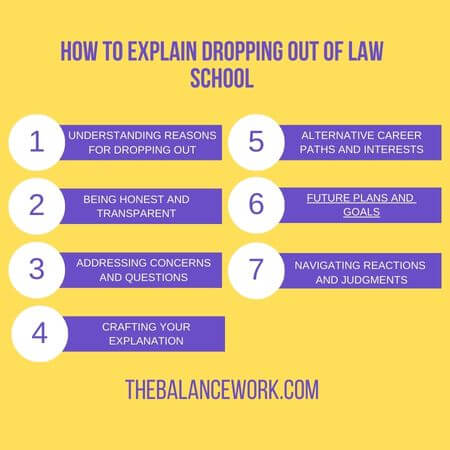How to explain dropping out of law school? Explaining dropping out of law school requires honesty and clarity.
Sharing genuine reasons, emphasizing personal growth, and discussing alternative career paths are important.
How To Explain Dropping Out Of Law School?
The decision to drop out of law school is crucial for several reasons. It helps others understand your motivations and provides clarity on your plans.
It also lets you address potential concerns and misconceptions when sharing this decision.
When discussing the decision to drop out of law school, it’s important to anticipate and address potential concerns that others may have.
This includes concerns related to career prospects, financial investments, and the impact on future goals.
Navigating the conversation with empathy, honesty, and clear communication can help foster understanding and support.
Understanding Your Reasons For Dropping Out
Before explaining the decision to drop out of law school, take time for self-reflection. Evaluate your motivations, interests, and goals.
Consider why you initially chose law school and what led you to reconsider your path.
Self-reflection helps you clarify your decision and articulate your reasons effectively to others.
1. Identifying Personal Motivations And Factors Influencing The Decision:
When explaining it to others, it is important to identify the personal motivations and factors that influenced your decision to drop out.
It may involve factors such as a lack of passion for the legal profession, challenges with the academic environment, or a realization that your skills lie in other areas.
Sharing these factors authentically can help others understand your perspective.
2. Discovering Alternative Passions And Career Paths:
One of the key aspects of dropping out of law school is the exploration of alternative passions and career paths.

Explain how you discovered new interests and opportunities that align with your strengths and aspirations.
Emphasize your enthusiasm and dedication to pursuing a fulfilling and meaningful career outside of law.
Being Honest And Transparent
Honesty is vital when explaining the decision to drop out of law school. Be genuine about your thoughts, emotions, and reasons behind your choice.
Honesty allows others to trust your perspective and demonstrates your commitment to personal authenticity.
1. Sharing Genuine Motivations And Experiences:
When explaining your decision, share genuine motivations and experiences that led to your choice.
This may include discussing specific challenges you faced, personal growth you achieved, or a mismatch between your expectations and the reality of law school.
Sharing these experiences helps others understand the depth of your decision.
2. Avoiding Sugarcoating And Providing A Clear Explanation:
While it’s important to express your decision with empathy, it’s equally essential to avoid sugarcoating the reasons behind it.
Clearly articulate the factors that influenced your decision, ensuring others comprehensively understand your thought process.
A clear explanation promotes open and honest communication.
Addressing Concerns And Questions
When explaining your decision to drop out of law school, it’s important to anticipate the concerns and questions that others may have.
Common concerns may revolve around financial investments, career prospects, and the impact on your future goals.
You can be better prepared to address these concerns effectively by anticipating them.
1. Preparing Thoughtful Responses To Financial And Career-Related Concerns:
When discussing dropping out of law school, financial and career-related concerns are likely to arise.
To address these concerns, consider preparing thoughtful and well-reasoned responses.

Discuss any financial considerations you have made, such as evaluating the long-term return on investment.
Additionally, emphasize how your decision aligns with your career aspirations and the opportunities you pursue outside law.
2. Demonstrating Consideration Of The Decision’s Implications:
Show that you have carefully considered the implications of your decision to drop out of law school.
This may involve discussing your plans’ impact and the steps you have taken to realign your career path.
It may also include how your decision aligns with your personal and professional growth.
Demonstrating consideration and thoughtfulness can help alleviate concerns and showcase your dedication to making well-informed choices.
Crafting Your Explanation
When crafting your explanation, aim for clarity and conciseness.
Begin with a straightforward statement that you have decided to drop law school.
Keep your explanation focused, avoiding unnecessary details or lengthy explanations.
Clear and concise communication allows others to grasp your decision more easily.
1. Beginning with a straightforward statement of the decision:
Start your explanation with a direct and unambiguous statement about your decision to drop out of law school.
This upfront approach sets the tone for the conversation and ensures your message is clear.
Avoid beating around the bush and get to the core of your decision.
2. Explaining The Reasons For Dropping Out In A Focused Manner:
Explain the reasons for your decision to drop out in a focused and organized manner. Outline the key factors that influenced your choice and discuss them systematically.
By presenting your reasons coherently, you help others understand the rationale behind your decision.
Provide them with a comprehensive view of your thought process.
3. Highlighting Personal Growth And Learning Experiences From Law School:
While explaining your decision, emphasize the personal growth and learning experiences you gained in law school.
Highlight the skills you acquired, such as critical thinking, analytical reasoning, or effective communication.
Showcase how these experiences have shaped you positively, even if your career trajectory has shifted.
Alternative Career Paths And Interests
When explaining your decision to drop out of law school, you must share the alternative career paths or interests you have identified.
Discuss the specific fields or industries you are exploring and explain how these align better with your passions and aspirations.
Sharing your newfound interests can demonstrate your openness to diverse opportunities and showcase your proactive approach to finding a fulfilling career.
1. Expressing enthusiasm and sincerity about new opportunities:
Expressing genuine enthusiasm and sincerity is important when discussing alternative career paths or interests.
Share your excitement about the new opportunities you have discovered and explain how they align with your personal and professional goals.

Conveying your passion and commitment to pursuing these new paths can help others understand the authenticity and motivation behind your decision.
2. Emphasizing Transferable Skills Gained From Law School:
Even though you are no longer pursuing a legal career, emphasize the transferable skills you gained in law school.
Highlight skills such as research, critical thinking, analysis, writing, or negotiation that can be valuable in various professional contexts.
By showcasing these skills, you can demonstrate how your legal education has equipped you with a strong foundation for success in alternative career paths.
Future Plans and Goals
Discuss your plans and aspirations when explaining your decision to drop law school.
Clearly articulate the direction you are taking and the goals you have set for yourself.
Share your vision for the future and how it aligns with your alternative career paths or interests.
This will demonstrate your forward-thinking mindset and commitment to personal and professional growth.
1. Outlining Steps Taken To Pursue New Goals:
Outline the steps you have taken or are planning to pursue your new goals.
Discuss any courses, certifications, or internships you intend to pursue to enhance your skills and knowledge in your chosen field.
You can illustrate your determination and dedication to succeed in your new endeavors by showcasing your proactive approach to self-improvement.
2. Demonstrating Determination And Commitment To Success:
Throughout your explanation, it’s crucial to demonstrate your determination and commitment to success.
Share any challenges you have overcome, setbacks you have faced, or sacrifices you have made to pursue your new path.
By highlighting your perseverance and resilience, you can inspire confidence in others regarding your ability to thrive in your chosen field.
As you encounter reactions and judgments from others, it is important to maintain confidence in your decision.
Remember that you have carefully considered your options and chosen a path that aligns with your passions and goals.

Stay firm in your conviction, and let your confidence shine through when addressing doubts or criticisms.
1. Seeking Support From Understanding Individuals:
Seek support from individuals who are understanding and supportive of your decision.
Surround yourself with a network of mentors, friends, or family members who believe in your abilities and encourage your new direction.
Their support and understanding can provide the reassurance and strength you need to navigate negative reactions or judgments.
2. Viewing Criticism As An Opportunity For Growth:
Rather than allowing criticism to discourage you, view it as an opportunity for growth and self-improvement.
Consider your feedback and use it constructively to refine your plans and enhance your skills.
Embrace criticism as a chance to learn, adapt, and become even stronger in your chosen path.
3. Understanding That Success Is Not Limited To One Path:
Success is not limited to a predefined path, such as completing law school.
There are numerous avenues to achieve fulfillment and success.
Embrace the idea that your chosen journey is unique and offers opportunities and rewards.
Trust in your ability to create a successful and fulfilling career on your terms.
Conclusion:
Explaining your decision to drop out of law school may be challenging.
Still, share alternative career paths, and express enthusiasm about new opportunities.
And determine and commitment to success, you can navigate the conversation with confidence.
Remember to stay true to yourself, seek support from understanding individuals, and view criticism as an opportunity for growth.
Embrace the belief that success is not limited to one path and forge ahead on your chosen journey toward a fulfilling and rewarding future.
Last Updated on 5 days by Shahzaib Arshad
- 7 Great Signs Your Boss Wants to Help You - October 8, 2023
- How To Explain Dropping Out Of Law School? Detailed Guide - September 6, 2023
- 10 Reasons Employees Get Fired in Workplace - August 27, 2023